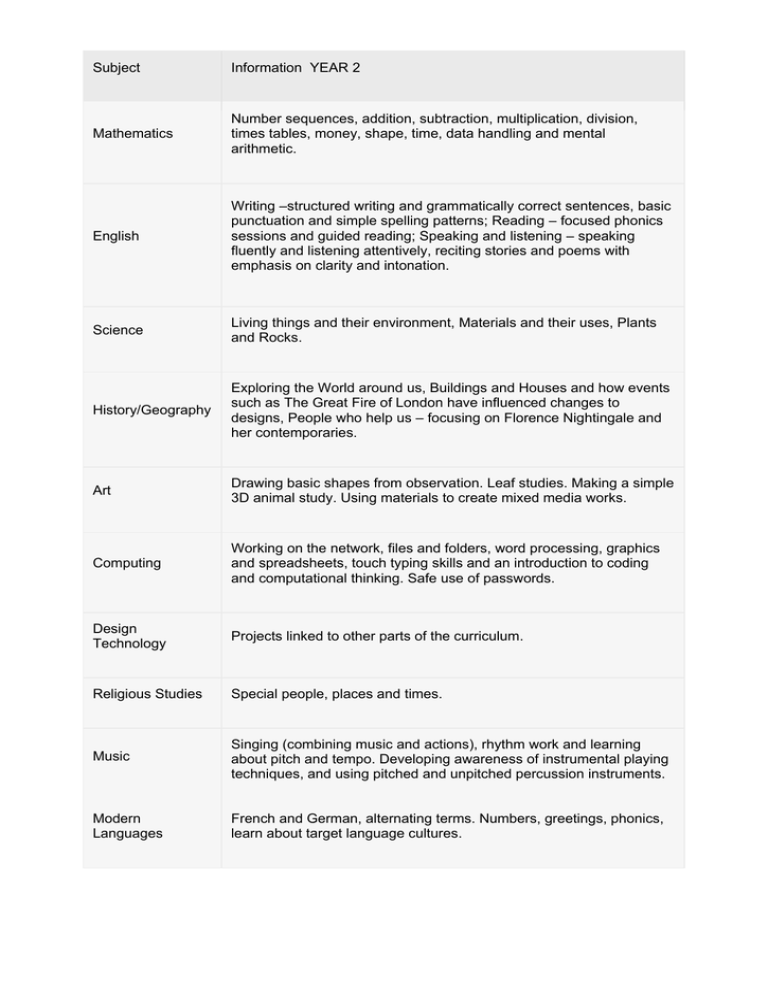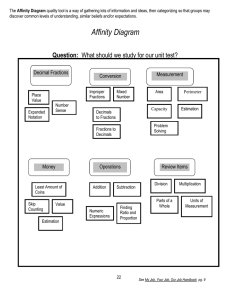Subject Information YEAR 2 Mathematics Number sequences
advertisement

Subject Information YEAR 2 Mathematics Number sequences, addition, subtraction, multiplication, division, times tables, money, shape, time, data handling and mental arithmetic. English Writing –structured writing and grammatically correct sentences, basic punctuation and simple spelling patterns; Reading – focused phonics sessions and guided reading; Speaking and listening – speaking fluently and listening attentively, reciting stories and poems with emphasis on clarity and intonation. Science Living things and their environment, Materials and their uses, Plants and Rocks. History/Geography Exploring the World around us, Buildings and Houses and how events such as The Great Fire of London have influenced changes to designs, People who help us – focusing on Florence Nightingale and her contemporaries. Art Drawing basic shapes from observation. Leaf studies. Making a simple 3D animal study. Using materials to create mixed media works. Computing Working on the network, files and folders, word processing, graphics and spreadsheets, touch typing skills and an introduction to coding and computational thinking. Safe use of passwords. Design Technology Projects linked to other parts of the curriculum. Religious Studies Special people, places and times. Music Singing (combining music and actions), rhythm work and learning about pitch and tempo. Developing awareness of instrumental playing techniques, and using pitched and unpitched percussion instruments. Modern Languages French and German, alternating terms. Numbers, greetings, phonics, learn about target language cultures. Subject Information YEAR 3 Mathematics Number e.g. place value, ordering numbers; Addition and subtraction – mental strategies and written method; Multiplication and division - mental strategies and written method; Fractions e.g. recognising fractions, fractions of quantities, equivalent fractions, addition/subtraction; Measurement – weight, capacity, length, perimeter, time, money; Geometry e.g. 2-D & 3-D shape, angles; Statistics e.g. pictograms, bar charts, using tables; Word problems. English Writing – planning and editing structured writing and grammatically correct sentences, extending punctuation skills and exploring spelling rules linked to letter strings and phonological patterns ; Reading – focused phonics sessions, guided reading and whole class shared reading; Speaking and listening –expressing and explaining own opinions and beliefs, sustaining conversation, listening attentively and responding with relevant comments and questions. Science The human body, forces and motion and habitats. Roman Empire and its impact on Britain. Stone age/Bronze age. History Clapham village. Geography Where in the World? Weather and the local environment. Art Drawing from observation. African mask studies. Fish studies. Making a 3D / low relief study. Using materials to create mixed media works. Computing Further work on word processing, graphics, spreadsheets, desk top publishing, cartoons and animation. An introduction to coding games, developing computational thinking and understanding algorithms. The correct use of email and importance of password safety. Design Technology Roman Shields/Tea pot stands, Pop up Easter cards and baskets, tiled houses. Religious Studies Key stories and religious figures from Christian, Jewish and Sikh holy texts. Music Singing (creating action songs and learning about rounds and nonsense songs), pentatonic scales, rhythm work, using pitched and unpitched percussion instruments. Modern Languages French and German, alternating terms. Phonics, everyday language, recognising main word classes, responding to simple songs, poems, stories. Subject Information YEAR 4 Mathematics Number e.g. place value, ordering numbers, rounding; Addition and subtraction – mental strategies and written method; Multiplication and division - mental strategies and written method; Fractions e.g. fractions of quantities, equivalent fractions, addition/subtraction, decimal fractions, rounding decimals, ordering decimals; Measurement – weight, capacity, length, perimeter, area, time, money; Geometry e.g. 2-D shape, symmetry, comparing angles, co-ordinates; Statistics e.g. pictograms, bar charts, using tables, continuous data; Word problems. English Writing – planning, writing, editing and revising a variety of genres of writing, extending punctuation work and developing knowledge of spelling rules; Reading – individual reading taught accessing reading scheme, class library and school library books. Class sharing of various genre. Speaking and listening – continued development of vocalisation of opinions and beliefs, engagement in drama activities with a cross curricular theme. Science Electricity and magnetism, heat, materials, environment and recycling. History Anglo-Saxons, Vikings and Normans. Geography South America, Arctic and the Antarctica, Europe and Global Warming. Art Simple observational drawing. Studies of hands developing into Mehndi design using a variety of media. Computing Word processing, graphics and a continuation of work on Excel. Animation, coding a racing game, computational thinking and developing a better understanding of how computers work. Developing an awareness of internet and gaming safety. Design Technology Clocks, jack-in-the-box and pocket puzzle. Religious Studies Places of worship, faith practises and sacred texts in Christianity, Judaism, Islam and Hinduism. Music Graphic scores, Indian Music, Instruments of the Orchestra, Musical Elements and composing Tudor fanfares using basic notation. Modern French and German, alternating terms. Begin to recognise and apply simple grammar patterns such as gender and number, respond to a wider Languages range of songs/poems/stories. Subject Information YEAR 5 Mathematics Number e.g. place value, ordering numbers, rounding, negative numbers; Addition and subtraction – mental strategies and written method; Multiplication and division - mental strategies and written method; Fractions e.g. fractions of quantities, equivalent fractions, mixed numbers, improper fractions, addition/subtraction, multiplying fractions, decimal fractions, rounding decimals, ordering decimals, addition and subtraction of decimals, percentages; Measurement – converting metric units, length problems, weight problems, capacity problems, area and perimeter, volume, time; Geometry e.g. comparing angles, measuring angles, angles and straight lines, 3-D shape, reflections, translations; Statistics e.g. line graphs, frequency tables, interpreting tables, timetables. English Planning, drafting, writing, evaluating and editing pieces of writing for a range of different audiences and purposes whilst accurately applying spelling, punctuation and grammar rules. Using figurative language and a range of literary devices to extend written work. Reading a range of literature and developing the ability to retrieve information, make inferences and make predictions from clues in the text. Developing the ability to explain ideas, ask questions, summarise texts and deliver presentations fluently and accurately. Science Safety in the lab, the senses, Light, sound, 3 states of matter, plants and classification. The achievements of the earliest civilisations (e.g. Ancient Sumer; The Indus Valley; Ancient Egypt) History A study of an aspect or theme in British history which extends chronological knowledge beyond 1066 – Tudors. Geography Water and rivers, locational knowledge of the UK, map skills and settlements. Art Observational drawing of natural forms using a variety of media including 3D and printing. Computing Spreadsheets, desk top publishing, Prezi presentations, graphics, coding games.animation with Lego, Computational thinking, using algorithms to solve problems and a wider knowledge of networks. Developing digital literacy skills. Design Technology Projects: making an electronic money box and Alarms, buggies and using vacuum forming techniques. Structures – testing bridges to destruction. Religious Studies Christian denominations. Rites of passage for Christianity, Judaism, Sikhism and Islam. Music African Music/Drumming, Blues Music, Traditional British Music and understanding/reading standard musical notation. Modern Languages French and German, alternating terms. Join in short conversations, recognise and apply grammar patterns such as simple verb conjugations, understand and express feelings and simple opinions. Subject Information YEAR 6 Mathematics Number e.g. place value, ordering numbers, rounding, negative numbers; Addition and subtraction – mental strategies and written method; Multiplication and division - mental strategies and written method; Fractions e.g. simplifying fractions, fractions of quantities, equivalent fractions, addition/subtraction, multiplying fractions, dividing fractions, decimal fractions, rounding decimals, multiplication and division of decimals, remainders as decimals, percentages; Ratio and Proportion; Algebra; Measurement – converting metric units, reading scales, area and perimeter, volume, multi-step problems; Geometry e.g. estimating angles, missing angles, 2-D and 3-D shape, co-ordinates, reflections, translations; Statistics e.g. pie charts, conversion graphs, line graphs, finding the mean. English Planning, drafting, writing, evaluating and editing pieces of writing for a wide range of different audiences and purposes whilst accurately applying spelling, punctuation and grammar rules. Using figurative language and a range of literary devices to extend and enhance written work. Demonstrating an appreciation of the differences between formal and informal speech and writing. Reading a range of literature and developing the ability to retrieve information, make inferences and make predictions from clues in the text. Explaining ideas, asking questions, summarising texts and delivering presentations fluently and accurately. Science Forces, the body, biology and chemistry. History Ancient Greece, a local history study – The Victorians. Maya civilisation. Geography World biomes, Mountains, volcanoes and earthquakes, Environments around the World - savannahs, tropical rainforests and deserts. Art Observational drawings based on ‘Still Life’ theme. Drawing from primary source materials and developing the initial studies using a variety of mixed media including 3D studies. Computing Coding games and how algorithms work, designing and making an app, animation and spreadsheets. Ensuring a deep understanding of digital literacy and the safe use of social media. Design Technology Anodised aluminium jewellery, electronics and control. Religious Studies Holy books, beliefs and key faith practises for Christianity, Islam, Judaism, Sikhism and Hinduism. Music Rap Music, Music Technology (GarageBand), Melody Writing (composition), Theme and Variations, learning hymns in preparation for Senior School. Modern Languages French and German, alternating terms. Understand longer and more complex sentences, use the language confidently to give prepared presentations, write sentences and short texts on a wider range of topics using a model.
